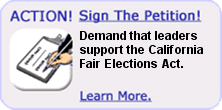Cleaning Up Politics With 'Clean Money'
The anticipated revelations of Jack Abramoff, the so-called "super-lobbyist" who lavished millions of dollars on members of Congress, threaten to lay bare the corrupting influence of money on politics.
Which shouldn't surprise anyone, except maybe Capt. Louis
Renault.
Renault, of course, is the French cop in the movie
"Casablanca" who famously says he is "shocked - shocked! -
to find that gambling is going on" at Rick's Cafe. At that
point, a croupier hands him a wad of cash and says, "Your
winnings, sir."
Likewise, it's pretty much only the people involved in the
system who express shock - shock! - that lobbyists like
Abramoff are using wads of cash to tilt the political
playing field.
Arnold Schwarzenegger could see it - until he, too, became
part of it.
"Here's how it works," he said in a TV ad when he ran for
governor. "Money comes in, favors go out. The people
lose."
Then he got elected and set new records for
fund-raising.
But don't blame the politicians, or even the lobbyists,
says Bonnie Allen of Petaluma. "Lobbying isn't the problem
- it's a symptom," she says.
The cure, according to Allen and a growing number of
good-government activists, is "clean money."
Clean money is campaign cash that comes with no strings
attached, money that is given to candidates with no
expectation that they will offer anything in return except
to fairly and honestly represent all of their
constituents.
It's also another way of describ- ing "public campaign
financing," a phrase that turns a lot of people off. But
would they rather continue the system that produced Jack
Abramoff?
Already, clean money is changing the political culture in
several states, including Arizona, Maine and, most
recently, Connecticut. A bill in the California Assembly
seeks to make this state the next.
AB 583 by Assemblywoman Loni Hancock, D-Berkeley, would
provide public financing to candidates for statewide office
and the Legislature who can also show grassroots support in
the form of a qualifying number of $5 donations from
individuals. No candidate would be required to use public
financing, but those who do would accept limits on how much
they can spend. (For details, go to www.caclean.org.)
The bill doesn't specify exactly where the money will come
from, but some suggest that a good source could be found by
closing the tax loopholes enjoyed by many of the
corporations that now spend so much money on campaign
contributions in California.
I know you're shocked - shocked! - that a Berkeley Democrat
is behind this, but she's not alone. North Bay Assembly
members Patty Berg, Noreen Evans and Joe Nation are among
the co-authors. In Arizona in 2002, 22 Republicans and 17
Democrats used clean money to win office.
In California, Assembly members begin fund-raising for the
next cam- paign cycle almost immediately after winning
election to a two-year term. With clean money, they could
concentrate on something else.
Would it shock you if they found a better use for their
time?
In last Wednesday's column describing the rift between
Schwarzenegger and Democrats in the Legisature, I quoted
Assemblywoman Evans asking, "Why should we do anything to
help him in an election year?" While Evans acknowledges
that "might be the prevailing attitude in the Legislature,"
she says it is not her "personal attitude."
Also Wednesday, I said leaders of state employee unions
plan to support a ballot initiative raising the minimum
wage and tying future increases to the cost of living.
While union leaders do support cost-of-living provisions,
they have not yet endorsed either of the minimum- wage
initiatives now in circulation.
See the article on Santa Rosa Press-Democrat website
(In accordance with Title 17 U.S.C. Section 107, this material is distributed without profit to those who have expressed a prior interest in receiving the included information for research and educational purposes.)

